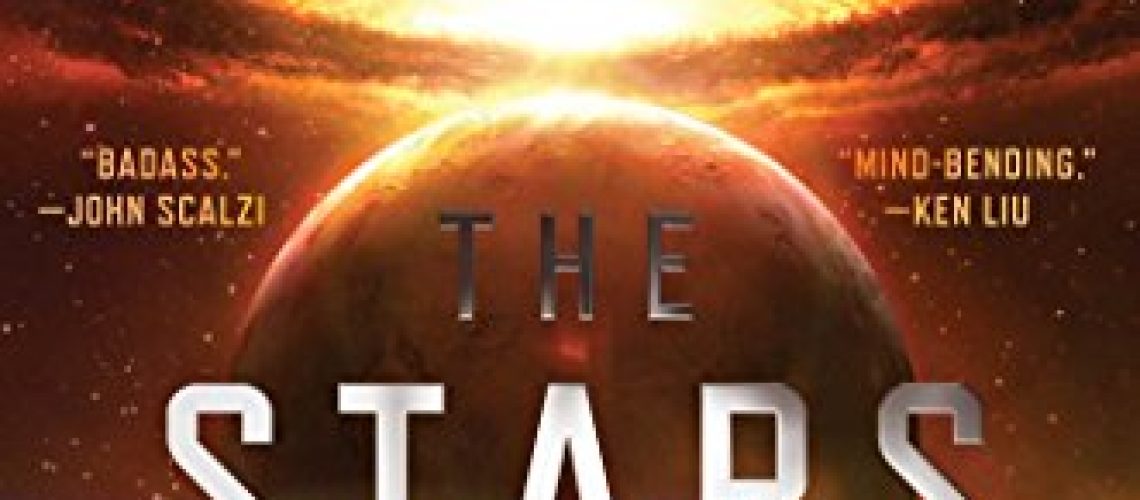I came to Kameron Hurley’s work early, getting a copy of God’s War back at the beginning of her career, and following her work and worlds since. Sometimes I’ve had questions or issues with her work, but throughout, the “blood, bugs, and brutal women” that have been a hallmark of all of her worlds and characters have sustained my reading interest and been a welcome expenditure of my reading time. It was thus with great anticipation that I picked up The Stars Are Legion, the new Space Opera from Hurley.
I started this review and continue to engage with the author on a metatextual as well as a textual level because her work responds to that sort of analysis. No writer is separate from her creation, but some writers are very intimately connected to what they write, how they write, and why they write as they do. Hurley falls into this camp. So, I went into the novel with expectations that there would be strong female characters, violence, perhaps worldbuilding that might frustrate me a tiny bit, and a harsh and high contrast verse that engages my senses. In photography terms, instead of a placid and straightforward landscape or portrait, Hurley’s work pushes pixels in both directions, sometimes discordantly, to deliberate and eye-arresting effect.
So, The Stars are Legion. Space Opera, in a dying universe, with Worldships locked in conflict and combat over an ever dwindling amount of resources, material, planets, and well, women. Going back to the first chapter of God’s War, where the sale of a uterus is mentioned as part of the backstory, Hurley’s books have engaged and tackled women’s bodies, autonomy, and concerns in a direct way that few other books I’ve read have dared. In that way, I see Hurley’s work as a true Heiress of Joanna Russ.
The Stars are Legion is Zan’s story, and I saw it very much as a literal hero’s journey. Zan starts off the story ignorant, amnesiac even of who and what she is, and even though the clever reader can figure out who and what she is before Zan buys a clue, that journey is an emotional one that builds and binds the character, and those around and with her on her trek, quite well. She does literally does follow a Campbellian model, falling to the dark center of her world, encountering danger there, and discovering and escaping, learning about herself, her world, and her future in the process. I was also perversely reminded of the video game Ultima Underworld, where the Avatar is locked deep in a dungeon and has a long and perilous journey to escape and find out the truth of things.
While Zan’s story is the major throughline of the novel, the novel also belongs to Jayd, our other viewpoint character. While Zan’s Memento-like story is a puzzle to figure out, it is a puzzle that is not decipherable apart from Jayd’s tale of rebellion, love, ambition, pregnancy and ultimately hope. Jayd’ story for me represented the chance to break old cycles and strive to avoid the same old paths that had brought the characters to the same point time and again. There is almost a bit of a Groundhog Day sort of effect here, and in Jayd’s relations with her mother, and with Zan, and especially with Rasida, with whom, perhaps, a new world can be born.
There are plenty of little touches, too, besides the protagonists, that mark this as something new and evolved. The fact that every character in the book is female, for example. What would be expected and accepted without criticism if it were, say, men, stands out here. It’s a social and political argument in a SF novel, backed by the author’s advocacy and point of view, and it works. In SF sometimes we do go in circles, and Russ and Butler and Tiptree are recapitulated in some ways by Hurley’s writing and point of view, but that recapitulation is necessary, important, and it works with the story.
On a more neutral note, the epigrams, for example, most of which are attributed to “Lord Mokshi,” serve multiple purposes within the story. They heighten and illuminate the mystery of who and what Lord Mokshi is, a plotline that runs through the novel. They also do a nice bit of setting up the action and themes of a chapter or a character within the story, preparing the reader for the next bit in an in-world manner that helps with the immersion into Hurley’s world. The first chapter, for example has the portentous epigram that helps set up Zan’s plight and character:
“There is nothing I fear more than someone without memory. A person without memory is free to do anything she likes.”
The Stars are Legion is not perfect. I think some of the plotting could be a little tighter, and I have some questions, as usual, about how some things in the world really work in practice. But a single-volume one-story space opera that tries different things, with character, voice, and setting, especially from the keyboard of Kameron Hurley, always gets my attention, and like her previous novels, is interesting and entertaining and extremely worthwhile to read. It’s frankly, to me, not the novel to start with her work, if you are curious (That is, frankly, God’s War, still). However, should you tread into and belike to remain within the Barony of Hurley, this is definitely a stop that you want to make.









0 Responses